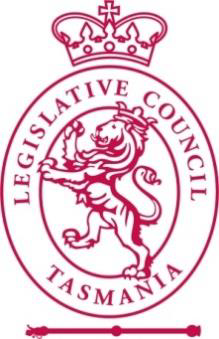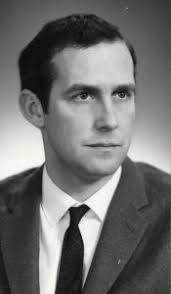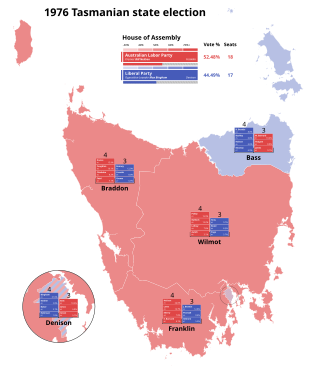Sources
- Parliament of Tasmania (2006). The Parliament of Tasmania from 1856
This is a list of members of the Tasmanian House of Assembly between the 11 December 1976 election and the 28 July 1979 election.
| Name | Party | Electorate | Years in office |
|---|---|---|---|
| Dr Julian Amos | Labor | Denison | 1976–1986, 1992–1996 |
| Terry Aulich | Labor | Wilmot | 1976–1982 |
| Bob Baker | Liberal | Denison | 1969–1980 |
| Hon Darrel Baldock | Labor | Wilmot | 1972–1987 |
| Hon Eric Barnard | Labor | Franklin | 1959–1979 |
| Hon Michael Barnard | Labor | Bass | 1969–1986 |
| Hon Neil Batt | Labor | Denison | 1969–1980; 1986–1989 |
| Bill Beattie | Liberal | Bass | 1946–1950; 1954–1979 |
| John Beattie | Liberal | Franklin | 1972–1989 |
| Hon Max Bingham | Liberal | Denison | 1969–1984 |
| Ray Bonney | Liberal | Braddon | 1972–1986 |
| Ian Braid | Liberal | Wilmot | 1969–1972; 1975–1995 |
| Max Bushby | Liberal | Bass | 1961–1986 |
| Hon Geoff Chisholm | Labor | Braddon | 1964–1979 |
| Ron Cornish | Liberal | Braddon | 1976–1998 |
| John Coughlan | Labor | Braddon | 1975–1986 |
| Glen Davies | Labor | Braddon | 1972–1986 |
| Michael Field | Labor | Braddon | 1976–1997 |
| Steve Gilmour | Liberal | Franklin | 1976–1979 |
| Robin Gray | Liberal | Wilmot | 1976–1995 |
| John Green | Labor | Denison | 1974–1980 |
| Roger Groom | Liberal | Braddon | 1976–1997 |
| Hon Harry Holgate | Labor | Bass | 1974–1992 |
| Gill James | Labor | Bass | 1976–1989, 1992–2002 |
| Hon Andrew Lohrey | Labor | Wilmot | 1972–1986 |
| Hon Doug Lowe | Labor | Franklin | 1969–1986 |
| Robert Mather | Liberal | Denison | 1964–1982 |
| Bill McKinnon [1] | Labor | Franklin | 1977–1979, 1979–1986 |
| Jim Mooney | Liberal | Bass | 1976–1979 |
| Hon Bill Neilson [1] | Labor | Franklin | 1946–1977 |
| Graeme Page | Liberal | Wilmot | 1976–1996 |
| Geoff Pearsall | Liberal | Franklin | 1969–1988 |
| Hon Michael Polley | Labor | Wilmot | 1972–2014 |
| Max Robinson | Liberal | Denison | 1976–1979 |
| Neil Robson | Liberal | Bass | 1976–1992 |
| Ray Sherry | Labor | Franklin | 1976–1979 |

The United Tasmania Group (UTG) is generally acknowledged as the world's first Green party to contest elections. The party was formed on 23 March 1972, during a meeting of the Lake Pedder Action Committee (LPAC) at the Hobart Town Hall in order to field political candidates in the April 1972 state election.

The Tasmanian Legislative Council is the upper house of the Parliament of Tasmania in Australia. It is one of the two chambers of the Parliament, the other being the House of Assembly. Both houses sit in Parliament House in the state capital, Hobart. Members of the Legislative Council are often referred to as MLCs.

Christine Anne Milne is an Australian politician who served as a Senator for Tasmania. She was the leader of the parliamentary caucus of the Australian Greens from 2012 to 2015. Milne stepped down as leader on 6 May 2015, replaced by Richard Di Natale.
In Australia, referendums are public votes held on important issues where the electorate may approve or reject a certain proposal. In contemporary usage, polls conducted on non-constitutional issues are known as plebiscites, with the term referendum being reserved solely for votes on constitutional changes, which is legally required to make a change to the Constitution of Australia.
Raymond John Groom is an Australian lawyer and former sportsman and politician, representing the Liberal Party in the Federal Parliament 1975–84 and the Tasmanian Parliament 1986–2001. He was a Federal and state minister for a total of 13 years. He was Premier of Tasmania from 1992 to 1996 and also served as Deputy Premier and Attorney-General.
Harold Norman Holgate AO was an Australian politician. He was premier of Tasmania from 1981 to 1982, serving as state leader of the Australian Labor Party (ALP) during that period. He succeeded Doug Lowe as party leader and premier during internal conflict over the Franklin Dam controversy, leading the ALP to defeat at the 1982 state election just over six months after taking office.

Douglas Ackley Lowe AM was the 35th Premier of Tasmania, from 1 December 1977 to 11 November 1981. His time as Premier coincided with controversy over a proposal to build a dam on Tasmania's Gordon River, which would have flooded parts of the Franklin River. The ensuing crisis saw Lowe overthrown as Premier and resign from the Labor Party, acting as an independent for the remainder of his political career.

William Arthur Neilson AC was Premier of Tasmania from 1975 to 1977.

Stephen Shane Parry is an Australian politician who was a Liberal Party senator for Tasmania from 2005 to 2017. He was elected President of the Senate in 2014. On 31 October 2017, Parry informed the government that he may be a British citizen, and issued his intention to resign from his position if dual nationality was confirmed. The next day he reported that he had received confirmation of his dual citizenship and, on 2 November, he resigned as president and from the Senate. He was replaced in the Senate by next Liberal Party Tasmanian Senate candidate and former senator Richard Colbeck after a recount.

Parliament House, Hobart, located on Salamanca Place in Hobart, Tasmania, Australia, is the meeting place of the Parliament of Tasmania. The building was originally designed as a customs house but changed use in 1841 when Tasmania achieved self-government. The building served both purposes from 1841 to 1904, when the customs offices were relocated.

Sir Charles Du Cane was a British Conservative Party politician and colonial administrator who was a Member of Parliament between 1852 and 1854 and Governor of Tasmania from 1868 to 1874.

The 1976 Tasmanian state election was held on 11 December 1976 in the Australian state of Tasmania to elect 35 members of the Tasmanian House of Assembly. The election used the Hare-Clark proportional representation system — seven members were elected from each of five electorates.

The 1979 Tasmanian state election was held on 28 July 1979 in the Australian state of Tasmania to elect 35 members of the Tasmanian House of Assembly. The election used the Hare-Clark proportional representation system — seven members were elected from each of five electorates. The quota required for election was 12.5% in each division.

The 1941 Tasmanian state election was held on 13 December 1941 in the Australian state of Tasmania to elect 30 members of the Tasmanian House of Assembly. The election used the Hare-Clark proportional representation system — six members were elected from each of five electorates.

The 1948 Tasmanian state election was held on 21 August 1948 in the Australian state of Tasmania to elect 30 members of the Tasmanian House of Assembly. The election used the Hare-Clark proportional representation system — six members were elected from each of five electorates.
This is a list of members of the Tasmanian House of Assembly between the 6 May 1950 election and the 19 February 1955 election.

Peter Carl Gutwein is a former Australian politician who was the 46th premier of Tasmania from 2020 to 2022. He was a Liberal Party member of the Tasmanian House of Assembly from 2002 to 2022, representing the electorate of Bass. He succeeded Will Hodgman as leader of the Liberal Party and Tasmanian Premier on 20 January 2020.

Women's suffrage in Australia was one of the early achievements of Australian democracy. Following the progressive establishment of male suffrage in the Australian colonies from the 1840s to the 1890s, an organised push for women's enfranchisement gathered momentum from the 1880s, and began to be legislated from the 1890s, decades in advance of Europe and North America. South Australian women achieved the right to vote in 1894, and to stand for office in 1895 following the world first Constitutional Amendment Act 1894. This preceded even male suffrage in Tasmania. Western Australia granted women the right to vote from 1899, although with racial restrictions. In 1902, the newly established Australian Parliament passed the Commonwealth Franchise Act 1902, which set a uniform law enabling European women to vote at federal elections and to stand for the federal parliament. All women of non-European descent were explicitly excluded from voting by the Commonwealth Franchise Act 1902, and up until 1962, "aboriginal natives" could be excluded from voting rights based on state legislation. By 1908, the remaining Australian states had legislated for women's suffrage for state elections. Grace Benny was elected as the first councillor in 1919, Edith Cowan the first state Parliamentarian in 1921, Dorothy Tangney the first Senator and Enid Lyons the first Member of the House of Representatives in 1943.

The Jacqui Lambie Network (JLN) is a political party in Australia, formed in May 2015, bearing the name of its founder, Tasmanian Senator Jacqui Lambie. The party is currently supporting the Rockliff Liberal Government in confidence and supply in Tasmania.
The Tasmanian Labor Party, officially known as the Australian Labor Party (Tasmanian Branch) and commonly referred to simply as Tasmanian Labor, is the Tasmanian branch of the Australian Labor Party. It has been one of the most successful state Labor parties in Australia in terms of electoral success.